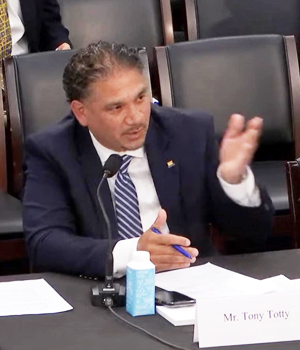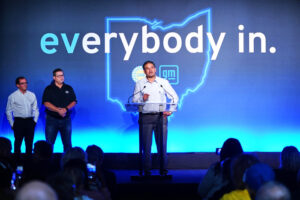
By Rev. Donald L. Perryman, Ph.D.
The Truth Contributor
Yesterday’s adaptations are today’s routines.
– Ronald Heifetz
In Tony Totty’s 25 years with General Motors, he has moved around often to several facilities in different states. Most moves were not because of choice but because facilities closed. Totty arrived in Toledo because the Willow Run factory in Michigan closed. Before then, he was a union steward in Lansing, and they shuttered that facility. Another facility he hired into in the Detroit area closed immediately after he arrived.
Totty’s experience is a familiar sad story in the automotive industry. Yet, the ability to face adaptive challenges has helped him lead labor members through change as they strive to shift to electric vehicles, “a potential industry revolution.” Analysts have described the process as the “biggest transformation of the automotive industry since its inception.”
Totty, the president of Toledo’s UAW Local 14, continued a dialog with President Joe Biden and successfully secured a $760 million investment from the federal government in September. Producing drive units for Electric Vehicles (EV) now ensures that Toledo GM workers won’t have to worry about plant closings or job stability.
I recently spoke with Tony Totty to discuss the adaptive challenge of navigating change and leading labor workers through uncharted territory.
 Perryman: Please talk about that $760 million investment and what it means for UAW Labor 14.
Perryman: Please talk about that $760 million investment and what it means for UAW Labor 14.
Totty: We’re the first facility in America to get drive units or EV work. We currently make transmissions, and this work will replace our 6-speed transmission. While we’re still producing 8, 9, and 10-speed transmissions, we also get to produce EV work. So, we’re going to have the best of both worlds. As the country shifts from internal combustion engines to electric vehicles, we’re well-positioned to make both.
Perryman: EVs have fewer parts, require a smaller labor force, and pay less. How does this affect unionization?
Totty: I won’t say less pay with inflation and everything else, so we’re still going to keep up the same way we would, but you are right. When you look industrywide, it should be 70 percent of our current labor force to produce EVs. So, it looks different. But we’re going to add workers at our facility because we will have production for three shifts on this new electric vehicle stuff, so our volume will increase.
If you look at it from a Toledo story, though, I’m afraid for UAW Local 12, our brothers and sisters over there. They have 43 units, the majority of them are in the auto industries, and the batteries that we produce today that they have, won’t translate into the EV.
As soon as I got this job two years ago, I advocated for anybody who would listen. ‘Hey, this change is coming, and we need to adapt to it.’ We need to look at these suppliers and try to secure the supplier base for electric Jeeps and what that will look like and try to secure as many jobs as possible, so the city’s not adversely impacted.
Perryman: So, my figures say the EVs require 30-40 percent less labor, and you’re saying GM can make up the difference by combining the internal combustion engine (ICE) work?
Totty: No, the engine work’s eventually going to be gone. When you look at what the country just went through with the semiconductors, it makes more sense to source these components for our vehicles here. And, with China flirting with what they’re doing to Taiwan, what does that look like if the US sanctions them and we can’t get stuff out of there?
Since it is the most significant transformation in our industry since its inception, we need to think outside the box and just go old school and source these things here. That will offset the impact of potential job loss or what we know that is going to happen. It’s not an “if” but a “when.”
Perryman: Rather than outsourcing the actual battery production, would GM consider forward integration or even retraining workers to manufacture these batteries in-house?
Totty: Yes, we’d be better off, but they’ve got a dollar amount associated with everything. That’s why it’s going to be imperative for us to address that at our 2023 contract negotiations, and we have a long list of things we want and deserve. We also know we can’t price ourselves out of the competition. Unfortunately, there are only three organized car facilities in this country. So even though we’re only five percent of the cost of the vehicle, when you have people in Mexico making $3 an hour, some parts are being sourced in some areas of Asia that are very questionable. I can’t compete. I can’t slander the company, but I can’t compete with an eight-year-old kid from Bangladesh or whatever they’re doing over there. We need fair trade, not free trade.
Perryman: Please talk about what you are doing to ensure that Local 14 members are not left behind.
Totty: If trillions of our taxpayer dollars will go to this electric rig to make these vehicles go, we need a new deal. I wrote a letter to the president when I just went out recently to talk to a subcommittee in Congress. Marcy Kaptur invited me out there a few months ago, and we had Joe Biden at our union hall in 2020. I wrote him a letter saying that part of Build Back Better is staying with the workers who are doing the job today. He wrote on one of the campaign signs, ‘You won’t be left behind, I promise.’
We did secure the work, and this was the 2.0 letter of saying, ‘hey, one of the core principles about the union is it’s not just about you. It’s about others.’ I said I have my union brothers and sisters at other facilities that will face closure. So, we need a task force encompassing transportation, energy, and trade, and these entities must come together. We need to look at this because we have a golden opportunity here where we could rebalance our trade deficit off this if we acknowledge the moment we’re in and the gains we could actually make if we adjust this right now.
Perryman: Talk about any potential diversity and equity inclusion opportunities in the EV supply chain.
Totty: I just had breakfast today with somebody. Charging stations are something I’ve advocated for a while. When you look at grants that go out or the inclusion that you see, it’s there for the taking—shame on us for not capturing that and putting our city to work. There is a huge opportunity for this. It’s just who has the capital and the vision to go after it.
Perryman: I’ve seen over and over this exciting commercial with this beautiful young lady, Regina King, driving a Cadillac Lyric. It’s made me want to own one of those vehicles. Should we all go out and buy an EV today?
Totty: My General Motors counterparts would want me to say yes. However, if everybody went out to buy an EV today, there wouldn’t be enough supply. Many people are saying I want my gas, and that’s fine. We would be foolish just to set an arbitrary date and exit the market no matter what. So, I think it’s aspirational for them to say 2035. The market will dictate because if we stop selling gas and run all EVs, yet there’s this huge market for EVs, somebody will get those sales. I don’t see General Motors doing that. It was good for their stock price to make that statement, and it was suitable for a goal to be set, but the market will dictate our production.
 Perryman: From a practical standpoint, is the cost of driving an EV on par with driving an ICE?
Perryman: From a practical standpoint, is the cost of driving an EV on par with driving an ICE?
Totty: Yes, clearly. When you look at the rebates that you get, and when you look at especially if you’re a General Motors employee. We have charging stations where you can charge your vehicle for free. You go into work all day, and you have it on a GM charger, and then you leave, and you may never have to pay for electricity. You just charge it while you’re at work. Just think if you didn’t have to pay for gas because that’s essentially the same thing.
Perryman: Are there additional opportunities to take advantage of the transition to EV?
Totty: I am fortunate to sit on the Toledo Technology Academy (TTA) board. This is the 25th year of TTA, which was started by UAW Local 14, General Motors and Toledo Public Schools. We’ll have a repair and maintenance electric vehicle facility there, and that’s how we need to think. We must think smarter about this and grab as much real estate as possible. That’s why I’m advocating for charging stations to be made here in this school. What it would look like is that during the day, kids could go there. When they graduate, they’ll have their EV mechanics certificate and their diploma. Those kids will be recruited like 5-star athletes just because there’s a shortage of mechanics. If these kids go to school for this, they will learn much more than just a mechanic trying to get certified in the state.
Perryman: How did this idea begin?
Totty: That started with a conversation I had with John Yark on a conference call with Marcy Kaptur. He was just talking about how he didn’t have enough mechanics now. I said you don’t have enough mechanics now, what does that look like with EV? Marcy Kaptur said, ‘Here’s $1.25 million for the school,’ and I’m working with Dr. Durant now to get the program off the ground. So that’s just another example. And not only that, but any displaced auto worker or mechanic could go there on the off hours when the students aren’t going there, so we fully utilize the building.
Perryman: So, for EV, the future is inevitable. Yet, many people are still in denial.
Totty: People can be in denial, and that’s fine. It’s up to leadership to chart the course for our community. People can vote by their purchases whether they’re in EV or not. Still, as leaders, when these corporations place multibillion-dollar bets, we have to pay attention. We have to be a part of it and for us to not recognize that and be a part is malpractice, and that ain’t gonna be us.
We had to negotiate this thing, but without our many partners, retirees and members, we don’t get this work. Toledo has a great history and reputation in the auto industry, and Detroit knows it. We’re just fortunate enough to, like I always say, land the plane when it comes to securing this new work.
Few times have we ever been given the opportunity to get in on something on the ground floor, and this is that moment, this is that time. So, our community will recognize and be a part of it. You can make about $100,000 a year with great benefits and no advanced education in these occupations. That says a lot.
So hopefully, our community can take advantage of that.
Contact Rev. Donald Perryman, PhD, at drdlperryman@centerofhopebaptist.org
